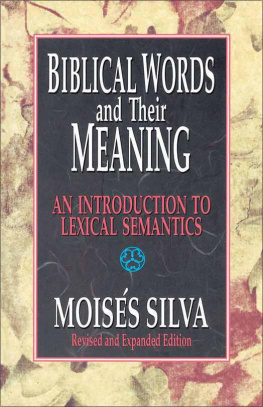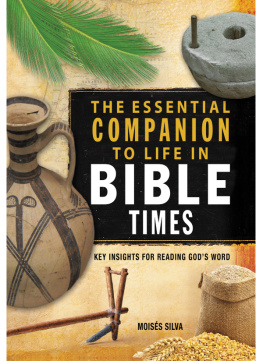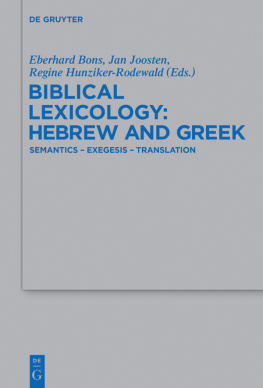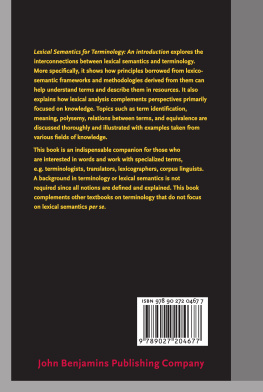Moisés Silva - Biblical Words and Their Meaning: An Introduction to Lexical Semantics
Here you can read online Moisés Silva - Biblical Words and Their Meaning: An Introduction to Lexical Semantics full text of the book (entire story) in english for free. Download pdf and epub, get meaning, cover and reviews about this ebook. year: 2010, publisher: Zondervan, genre: Religion. Description of the work, (preface) as well as reviews are available. Best literature library LitArk.com created for fans of good reading and offers a wide selection of genres:
Romance novel
Science fiction
Adventure
Detective
Science
History
Home and family
Prose
Art
Politics
Computer
Non-fiction
Religion
Business
Children
Humor
Choose a favorite category and find really read worthwhile books. Enjoy immersion in the world of imagination, feel the emotions of the characters or learn something new for yourself, make an fascinating discovery.
- Book:Biblical Words and Their Meaning: An Introduction to Lexical Semantics
- Author:
- Publisher:Zondervan
- Genre:
- Year:2010
- Rating:5 / 5
- Favourites:Add to favourites
- Your mark:
- 100
- 1
- 2
- 3
- 4
- 5
Biblical Words and Their Meaning: An Introduction to Lexical Semantics: summary, description and annotation
We offer to read an annotation, description, summary or preface (depends on what the author of the book "Biblical Words and Their Meaning: An Introduction to Lexical Semantics" wrote himself). If you haven't found the necessary information about the book — write in the comments, we will try to find it.
Moisés Silva: author's other books
Who wrote Biblical Words and Their Meaning: An Introduction to Lexical Semantics? Find out the surname, the name of the author of the book and a list of all author's works by series.
Biblical Words and Their Meaning: An Introduction to Lexical Semantics — read online for free the complete book (whole text) full work
Below is the text of the book, divided by pages. System saving the place of the last page read, allows you to conveniently read the book "Biblical Words and Their Meaning: An Introduction to Lexical Semantics" online for free, without having to search again every time where you left off. Put a bookmark, and you can go to the page where you finished reading at any time.
Font size:
Interval:
Bookmark:
REVISED AND EXPANDED EDITION

ZONDERVAN
Biblical Words and Their Meaning: AN INTRODUCTION TO LEXICAL SEMNATICS
Copyright 1983, 1994 by Moiss Silva
All rights reserved under International and Pan-American Copyright Conventions. By payment of the required fees, you have been granted the non-exclusive, non-transferable right to access and read the text of this e-book on-screen. No part of this text may be reproduced, transmitted, down-loaded, decompiled, reverse engineered, or stored in or introduced into any information storage and retrieval system, in any form or by any means, whether electronic or mechanical, now known or hereinafter invented, without the express written permission of Zondervan.
EPub Edition MARCH 2010 ISBN: 978-0-310-87151-4
Requests for information should be addressed to:
Zondervan Publishing House
Grand Rapids, Michigan 49530
Library of Congress Cataloging-in-Publication Data
Silva, Moiss
Biblical words and their meaning : an introduction to lexical semantics / by Moiss Silva.Rev. and expanded ed. p. cm.
Includes bibliographies references and index.
ISBN 0-310-47981-9 (pbk.)
1. BibleLanguage, style. 2. BibleHermeneutics. 3. Language and languagesreligious aspects. I. Title.
BS537.S54 1994
220.66-dc20
94-22633
CIP
All rights reserved. No part of this publication may be reproduced, stored in a retrieval system, or transmitted in any form or by any meanselectronic, mechanical, photocopy, recording, or any otherexcept for brief quotations in printed reviews, without the prior permission of the publisher.
The appendix, Distinguishing the Meaning of Greek Verbs in the Semantic Domain for Worship, is a revision of an article published under the same title in Filologia Neotestamentaria 4 (1991). Copyright 1990 by Karen H. Jobes. Used by permission.
94 95 96 97 98 99 00 01 02
TO PAT
Encouraged by the favorable reception that this book has enjoyed, the publishers and I have agreed that a new edition would be welcomed by biblical students.
Alterations in the body of the work are limited to minor corrections, since further research into lexical semantics has not led me to make significant changes in the interpretation or presentation of the data. Moreover, substantive criticisms have been few, such as the concern that my treatment of Septuagintal issues is somewhat superficial (see N. Fernndez Marcos in Revista espaola de lingstca 13 [1983]: 415-17) and that my use of both John Lyons and Eugene A. Nidas systems of classification could lead to confusion (see Richard J. Erickson in TSF Bulletin 7, no. 3 [Jan.-Feb. 1984]: 26).
Accordingly, it has seemed wise to preserve the original pagination for the convenience of readers who are familiar with the first edition. Instead of rewriting the text, then, I have sought to update the book through additional material. The new chapter, Recent Developments in Semantics, also makes it possible to formulate some further thoughts on the relevance of collocation to semantics and on the relationship between the word and its context.
One concern expressed by several reviewers was the lack of a substantive example of lexical study. I am therefore very appreciative to Karen H. Jobes for allowing me to include in the present edition an article that seeks to apply the lexical principles discussed here. That article was originally a paper written by her for one of my graduate courses and was subsequently published in Filologa neotestamentaria. Students have commented on the value of the article in illustrating the study of lexical fields, and so it seemed appropriate to make it readily available to readers of this book.
New readers should perhaps be advised that they need not go through all the chapters in sequence. The introduction and chapter 1 are foundational, but chapters 2 and 3 (especially the latter, which is fairly technical) may be skipped on a first reading. Chapter 4 also is foundational, but chapter 5 may be skimmed before proceeding to the last chapter, which is the most important.
This new edition goes out with the hope that it will aid studentsand those ministered to by themin the unique task of understanding the Scriptures.
Authors of an earlier century who filled title pages with neverending qualifications knew what they were doing. How can one adequately describe the contents of a book in one or two phrases? The present work, for example, makes the pretension of covering the broad field of word meanings in the Bible, a task that cannot be executed in one volume without oversimplifying the material. But on the other hand, unsuspecting readers who have not given much prior thought to linguistics may notice the subtitle and decide to tackle the book, only to wonder what my brand of semantics has done to the simple word introduction.
It is possible for students innocent of modern linguistics to understand this bookprovided they like a challenge. In the interests of such students I have supplied summaries for each chapter, a glossary, and a brief, annotated bibliography. Furthermore, a special effort has been made not to introduce new concepts without some explanation. Of necessity, however, these definitions are rather compressed, for it did not seem appropriate to make this book an elementary text in general linguistics. Those readers are thus most likely to enjoy and profit from this work who, recognizing the importance of the subject, have already acquired some understanding of standard linguistic concepts.
This introduction is intended for theological students who are familiar with the basic issues and methods of biblical scholarship and who know the elements of Greek and Hebrew, although a knowledge of the latter is not essential (Hebrew words are always transliterated; moreover, sections that presuppose acquaintance with Semitics may be skipped without losing the flow of the argument). A second-year seminary student should have no difficulty following and appreciating the material discussed here. I even cherish the hope that advanced students of linguistics, though unfamiliar with biblical scholarship, may profit from seeing their discipline applied to the ancient documents that constitute the Bible.
The chapters that follow aim at establishing the theoretical foundations that are logically prior to the development of procedure and thus should be regarded as a contribution to general hermeneutics (theory), not, at least not primarily, to exegetical method (practice). To be sure, examples and various kinds of illustrations are used repeatedly; moreover, certain parts of the book (portions of chaps. 1, 2, 6, and the conclusions) include material that has a direct practical bearing. Still, the dominant concern embraces principles and scientific assumptions. Any how-to manual that shortcuts these issues thereby invalidates itself. As a concession to the flesh, however, I should point out that chapters 3-5 need not be mastered before a reader can profit from the rest of the work.
What profit is there, however, in reading a book on this topic? One of the standard qualifications for becoming a linguist is the ability to express, as persuasively and unaffectedly as possible, complete astonishment that not every human being shares a passion for the scientific study of language. Biblical linguists are no exception. Acquaintance with up-to-date systematic work on the nature of language seems an indispensable foundation for proper exegesis. It could hardly occur to a serious student to make historical judgments without reference to the latest and most reliable archeological publications. How does one then explain the fact that even reputable scholars have attempted to shed light on the biblical languages while working in isolation from the results of contemporary linguistics? One could just as easily try to describe Jewish sects in the first century without a knowledge of the Dead Sea Scrolls.
Font size:
Interval:
Bookmark:
Similar books «Biblical Words and Their Meaning: An Introduction to Lexical Semantics»
Look at similar books to Biblical Words and Their Meaning: An Introduction to Lexical Semantics. We have selected literature similar in name and meaning in the hope of providing readers with more options to find new, interesting, not yet read works.
Discussion, reviews of the book Biblical Words and Their Meaning: An Introduction to Lexical Semantics and just readers' own opinions. Leave your comments, write what you think about the work, its meaning or the main characters. Specify what exactly you liked and what you didn't like, and why you think so.











